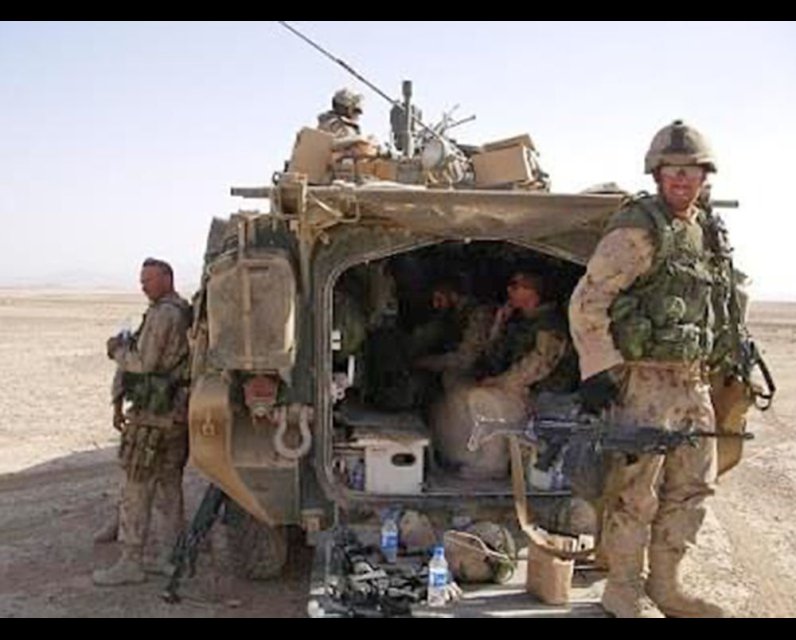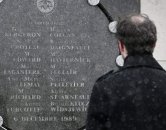Stay informed
Forgotten sacrifice: Afghanistan veterans say awarding Victoria Cross 'would be for all of us'

Remembrance Day has been commemorated in Canada since Parliament passed legislation in 1931 to change the name of Armistice Day and establish Nov. 11 as the date to mark the occasion. Today, the government describes Remembrance Day as “the most unforgettable day” and suggests veterans are “passing the torch” to the Canadian population “so the memory of their sacrifices will continue.”
However, many veterans of the war in Afghanistan now feel their sacrifice in service to their country is forgotten. One main reason for this sentiment, according to retired corporal Bruce Moncur, is that no veterans of this conflict have ever been awarded Canada’s highest military decoration for valour.
Retired lieutenant-general Omer Lavoie told National Post that eight service members throughout the Commonwealth have received Victoria Cross medals for their service in Afghanistan. Four have been awarded by Australia, three by the U.K., and one by New Zealand.
That no Victoria Cross decorations were received throughout a 12-year commitment during which more than 40,000 Canadian military members deployed for the mission does not sit well with many Afghanistan veterans, Moncur said.
“Yes, we feel forgotten,” he said.
He is part of a campaign to have certain valour awards reviewed and potentially upgraded to the Victoria Cross in response to this prevalent sense of forgotten sacrifice.
Moncur, who deployed to Afghanistan in 2006, says he has advocated for military veterans for about 15 years. As founder of the non-profit Valour in the Presence of the Enemy , he has spearheaded a campaign since September 2021 to have Afghanistan veteran Private Jess Larochelle’s valour decoration upgraded to the Victoria Cross.
“Ever since I heard Jess’s story,” Moncur told National Post, the issue “has always been in the back of my mind.”
Then Lt.-Col. Lavoie commanded 1st Battalion of the Royal Canadian Regiment Battle Group in southern Afghanistan in 2006 when a substantial contingent of Taliban insurgents ambushed the strongpoint manned by Larochelle and his unit. Lavoie recalls that he happened to be in the area on battlefield circulation that day.
As he was writing the recommendation for Larochelle’s military valour decoration in Afghanistan after the incident, he remembers thinking to himself, “This may turn out to be the first Victoria Cross awarded in the Canadian military since the Second World War.”
But it was not to be. Instead, Larochelle was one of twenty recipients of Canada’s second-highest military decoration awarded for service in Afghanistan.
The citation for the Star of Military Valour Larochelle received recalls, “Although he was alone, severely injured, and under sustained enemy fire in his exposed position at the ruined observation post,” he “aggressively provided covering fire over the otherwise undefended flank of his company’s position.”
Moncur is adamant that Larochelle’s actions that day in October 2006 at Strong Point Centre in Kandahar warrant the Victoria Cross. He also believes the issue is about more than just one medal.
Upgrading Larochelle’s Star of Military Valour, he says, “would be for all of us.”
Lavoie echoed Moncur’s sentiment. He suggests upgrading select existing decorations, like Larochelle’s, would bring “a sense of accomplishment for all Afghanistan veterans.”
He said this is especially the case because the highest award for valour has never been awarded since this decoration was redesignated as the Canadian Victoria Cross in 1993. Its predecessor, the British Victoria Cross, was awarded to 81 Canadians for acts of valour in combat from the South African (Boer) War (1899-1902) to the Second World War (1939-45).
The most recent recipient for Canada was Lieutenant Robert (Hammy) Hampton Gray, who was awarded the British Victoria Cross posthumously for combat action that occurred in August 1945. The Canadian version of the highest military award for valour has never been awarded — including for nearly 15 years of combat action in Afghanistan.
Master Warrant Officer William “Willy” MacDonald said that many veterans of the conflict in Afghanistan still grapple with the abrupt end to coalition operations due to the disastrous withdrawal from the country by the U.S. in 2021.
With the Taliban reestablishing its rule and meeting little resistance as it chased away security forces the NATO coalition spent years training, many veterans of the conflict in Canada and beyond now struggle with doubts regarding what was accomplished after nearly two decades of service and sacrifice.
Those emotional “wounds are still healing for many of us,” said MacDonald. He suggests that upgrading one or more valour awards to the Victoria Cross would “would do a lot to bring the Afghanistan mission back to the public spotlight.”
Moncur agrees. He highlighted the experience of Victoria Cross recipients in other Commonwealth countries as well as more than a dozen recipients of the Medal of Honor in the United States.
“What we’re asking for is the respect and honour that other countries give to their soldiers,” Moncur said. “Victoria Cross and Medal of Honor recipients are revered in their countries. But that hasn’t happened in Canada for Afghanistan veterans.”
This is why Larochelle’s Star of Military Valour has become a particular point of emphasis for the organization Moncur founded as well as the broader movement to upgrade certain decorations. “If what Jess did doesn’t merit the Victoria Cross,” Moncur said, “it’s hard to know what does.”
Although Larochelle died in August 2023 due to medical complications from injuries he sustained on deployment, reevaluating and upgrading his award is, according to Moncur, “one thing the government can do” to honour his memory and the service of thousands of other Canadian military members who served in Afghanistan.
Despite widespread support for the movement to have certain individual decorations reconsidered and potentially upgraded, some veterans remain concerned about attempts to override determinations that were made long ago by senior military officials.
Col. Ryan Jurkowski retired from the Canadian Armed Forces in 2023 after 30 years of service, including multiple deployments to Afghanistan. Now a PhD war studies candidate at the Royal Military College, focusing on civilian-military relations, he said, “you can’t rewrite history” when evaluating decisions from the past.
Jurkowski is also concerned about setting a precedent that could lead to more red tape that ultimately distracts from the warfighting mission of the military. This movement to upgrade certain awards might be “for all the right reasons,” Jurkowski said, but we should be concerned about the possibility of “increasing the bureaucracy of the (Canadian Armed Forces).”
Even so, Jurkowski wonders whether factors not directly related to individual citations and decorations impacted decisions by honours and awards committees and caused the sacrifice of some to be undervalued.
Canada’s overall mission in Afghanistan, which lasted from 2001 to 2014, was divided into three main operations : Apollo (2001-03), Athena (2003-11), and Attention (2011-14). The first was marked by intense but sporadic combat operations, while the last focused primarily on training Afghan security forces in Kabul.
The bulk of the heavy and sustained fighting occurred during Operation Athena, including 2006 when Larochelle deployed as part of the battle group commanded by Lavoie.
According to Jurkowski, troops encountered “completely different perspectives and completely different experiences in different phases” of the mission in Afghanistan. Both his combat deployments were during Operation Athena, with the renowned Princess Patricia’s Canadian Light Infantry .
“There has never been anything like the intensity of combat operations” during early in Operation Athena since Korea, according to Jurkowski. Heroic actions such as Larochelle’s solo stand at Strong Point Centre were relatively early in the Afghanistan mission.
This may have led senior leaders to be reluctant to approve a Victoria Cross, even if it was warranted on an individual basis, since it was impossible to know then what would happen in theatre later.
Lavoie also expressed concern regarding revisiting past decisions for valour decorations. He said at first, he felt “conflicted.” He served on honours and awards committees during his time as a military officer and said that “no one believes in the sanctity of the chain of command” more than he does.
An internal committee appointed by Department of National Defence has already determined that none of the 20 awards reviewed from the Afghanistan mission “should have received a different decoration, and that all awards respected the intent and criteria for the Star of Military Valour.”
Although deference to previous determinations is certainly warranted, Lavoie now supports the idea of appointing a commission. This is, at least in part, because he believes “there was a bit of reticence” to approve a Victoria Cross among senior leaders within the ranks during the early phase of combat operations.
He also points out there is precedent for revaluating military decorations among Canada’s closest allies. According to Lavoie, awarding a Victoria Cross to Larochelle or other potential recipients would bring “a sense of pride and accomplishment for all Afghanistan veterans.”
Moncur also emphasized during an interview the precedent of allied militaries appointing review commissions like the one he is currently proposing here in Canada. A petition he initiated in July calls on the government to establish an independent board “to review Afghanistan veterans’ cases where evidence suggests Victoria Cross criteria were met.”
The parliamentary petition, which is sponsored by Liberal MP Pauline Rochefort and closes for signatures on Nov. 20, states that “Afghanistan veterans feel their sacrifice has been forgotten, despite Canada’s significant commitment and casualties.”
With so many Afghanistan veterans expressing a sense that their service and sacrifice to Canada has been forgotten, Moncur believes the government must establish an independent review to consider whether certain valour decorations should be upgraded to the Victorica Cross.
“If you can’t do this” for Afghanistan veterans, Moncur said, “then you can’t do anything for us.”
Our website is the place for the latest breaking news, exclusive scoops, longreads and provocative commentary. Please bookmark nationalpost.com and sign up for our daily newsletter, Posted, here.



Comments
Be the first to comment